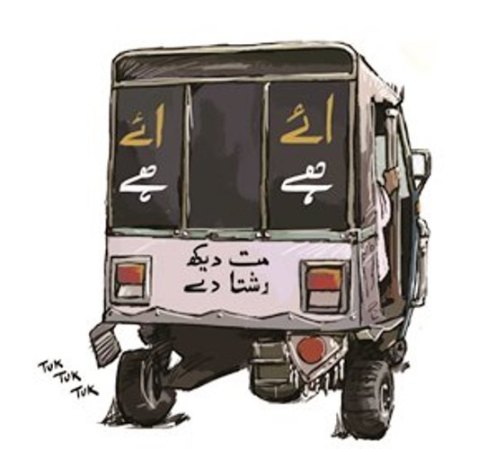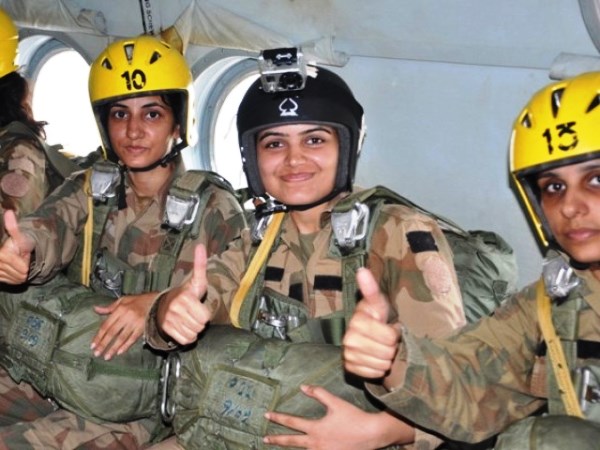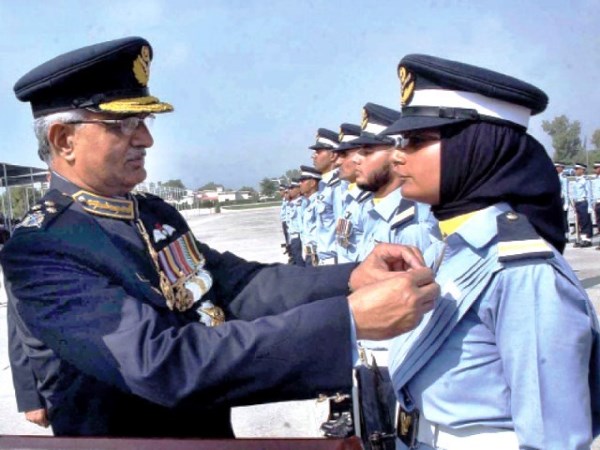
The first slap is the worst – red, hot searing pain across the face. But what sears through is more than a slap. Something breaks inside. A feeling of helplessness, vulnerability and a shattered sense of self-worth takes over which is why, a woman’s first reflex reaction is always disbelief; shock. It is an instant realisation of the painful reality that she will never forget that moment. That she will never be able to unlearn this blow.
Sanam Baloch depicted a battered woman’s experience beautifully in the recent Hum TV serial Kankar which ended on December 6, 2013. The serial, with its protagonist ‘Kiran’ being a woman who chooses ‘honour’ over a damaging and abusive marriage, seems to have hit a raw nerve with people. Its popularity lies in the fact that this play has managed to raise some important questions.
[caption id="" align="alignnone" width="600"] Sanam Baloch, who plays the role of Kiran in Kankar. Photo: Kankar Official Facebook Page[/caption]
With more and more research unearthing the fact that many Pakistani women get beaten in urban cities and a lot of them are educated women – it is not surprising then that a debate has ensued because of this play. I encountered a sample of that debate on my Facebook wall, at dinners and with close friends.
It was fascinating to me that Kiran’s character is that of a lower middle-class girl. The abusive but handsome and rich husband (played by Fahad Mustafa) claims to ‘love’ her and so is her ticket to a better, more affluent life.
In reality, a lot of urban and affluent women stay in abusive marriages, even suffering domestic violence, to maintain the social status and a standard of living.
But Kiran chooses to leave all of that behind.
[caption id="" align="alignnone" width="600"]
Sanam Baloch, who plays the role of Kiran in Kankar. Photo: Kankar Official Facebook Page[/caption]
With more and more research unearthing the fact that many Pakistani women get beaten in urban cities and a lot of them are educated women – it is not surprising then that a debate has ensued because of this play. I encountered a sample of that debate on my Facebook wall, at dinners and with close friends.
It was fascinating to me that Kiran’s character is that of a lower middle-class girl. The abusive but handsome and rich husband (played by Fahad Mustafa) claims to ‘love’ her and so is her ticket to a better, more affluent life.
In reality, a lot of urban and affluent women stay in abusive marriages, even suffering domestic violence, to maintain the social status and a standard of living.
But Kiran chooses to leave all of that behind.
[caption id="" align="alignnone" width="600"] Fahad Mustafa, who plays the role of Sikander in Kankar. Photo: Kankar Official Facebook Page[/caption]
She remarries a man who takes her around on a motorbike and she is busy with household chores all day. She leaves behind a life of luxury, simply because this man will potentially respect her more.
Mind you, she doesn’t leave Mr ‘I-love-you-means-I-can-beat-you’ right away. She gives him warnings and chances. It is after she miscarries when he hits her that she realises she has had enough.
But the responses I got to the question ‘did she do the right thing’ were a mix of encouraging and disturbing.
[caption id="" align="alignnone" width="450"]
Fahad Mustafa, who plays the role of Sikander in Kankar. Photo: Kankar Official Facebook Page[/caption]
She remarries a man who takes her around on a motorbike and she is busy with household chores all day. She leaves behind a life of luxury, simply because this man will potentially respect her more.
Mind you, she doesn’t leave Mr ‘I-love-you-means-I-can-beat-you’ right away. She gives him warnings and chances. It is after she miscarries when he hits her that she realises she has had enough.
But the responses I got to the question ‘did she do the right thing’ were a mix of encouraging and disturbing.
[caption id="" align="alignnone" width="450"] Cast of Kanker. Photo: Kanker Official Facebook Page[/caption]
One friend said,
Cast of Kanker. Photo: Kanker Official Facebook Page[/caption]
One friend said,
“Life is not a bed of roses; you have to compromise at some point. No one gets a perfect life, so one should see the positives and then decide.”This response made me think. Compromise is a good thing, but one can only compromise so much. And is it ok to compromise on things as serious as getting beaten up without reason? This was the view of another friend, a male, and I just listened, at a loss for words.
“But the reason she was beaten up was because she was a very headstrong woman! She argued too much. Women who don’t learn to keep quiet end up suffering. See, in this serial, he is fine with his second wife because she doesn’t argue.”Arguing to legitimise a beating? The logic somehow escaped me. However, as it turned out, in the next episode once the initial phase of the guy’s second marriage was over, he meted out the same treatment to his second wife. [caption id="" align="alignnone" width="600"]
 Photo: Kanker Official Facebook Page[/caption]
As expected, Kiran was stigmatised by society and even discouraged by her sister and parents to take a divorce. But here’s the catch: To her, her ‘izzat’ (honour) is more important than just her ‘ghar’ (home). Thus, the play shows a paradigm shift. It shows that for this strong woman, honour in fact lies in NOT accepting abuses, demeaning behaviour and violence. That to her, izzat is not in staying in a marriage which has her known as Mrs Someone socially but also has her reminded of her poor family and slapped when in the privacy of her bedroom.
A friend agreed when she commented,
Photo: Kanker Official Facebook Page[/caption]
As expected, Kiran was stigmatised by society and even discouraged by her sister and parents to take a divorce. But here’s the catch: To her, her ‘izzat’ (honour) is more important than just her ‘ghar’ (home). Thus, the play shows a paradigm shift. It shows that for this strong woman, honour in fact lies in NOT accepting abuses, demeaning behaviour and violence. That to her, izzat is not in staying in a marriage which has her known as Mrs Someone socially but also has her reminded of her poor family and slapped when in the privacy of her bedroom.
A friend agreed when she commented,
“It’s about whether we give more importance to money or izzat. If you give someone loads of money but no respect, is that a happy compromise?”To this friend, it was a no brainer that Kiran did the right thing. To others, it was not. One reason women stay on in such marriages is the often unrealistic hope that the person will change.
“You cannot change a person (completely). Many a women have wasted their lives in the hope… [while] a vicious cycle of abuse which only gets worse. And children brought up in this environment are more prone to psychological scarring,” said one friend on Facebook.But another felt, and not without solid reasons, that everyone deserves a chance, and with counselling and effort, many couples are able to break the vicious cycle of abuse. [caption id="" align="alignnone" width="600"]
 Kiran and Sikander as played by Sanam Baloch and Fahad Mustafa in Kanker. Photo: Kanker Official Facebook Page[/caption]
An interesting dynamic, as a young friend pointed out, was how this strategy of ‘controlling’ a woman via abuse is passed on like a family heirloom for generations.
Kiran and Sikander as played by Sanam Baloch and Fahad Mustafa in Kanker. Photo: Kanker Official Facebook Page[/caption]
An interesting dynamic, as a young friend pointed out, was how this strategy of ‘controlling’ a woman via abuse is passed on like a family heirloom for generations.
“Kankar makes for such an engrossing watch because of the complexities of each character. Sikander is the product of an abusive relationship and classical conditioning plays an important role in his upbringing; if the wife argues or says anything that might remotely resemble anything as having an opinion, give her a good whack. Whereas Kiran is the quintessential headstrong girl of our times –somebody who knows her rights and does not shy away from demanding them. She is not willing to be treated as a doormat, and rightly so,” she concluded.This friend rightly pointed out that the serial also shows the dichotomy between the earlier generation(s) and ours. Sikander’s mother didn’t think her self-esteem was at stake when she was physically abused by his father, because she lived a life in which complacent acceptance of her secondary position and denial that this is a serious issue is a norm. Perhaps women today are more open to the idea of ending a relationship on grounds of self-respect. Perhaps the best and most succinct comment came from a man, who believed that,
“Violence inflicted on a spouse (in particular) is never justified, unless it’s in self-defence or to protect another.”[embed width="620"]http://www.dailymotion.com/video/x17ywfg_kankar-last-episode-25-hd-promo-hum-tv-6-december-2013_shortfilms[/embed] This might be an especially good time to re-examine the debate that Kankar has managed to trigger. On the Human Rights Day that falls on December 10, 2013, a 16 day global campaign ends. This campaign started on November 25, 2013 which is the International Day for the Elimination of Violence against Women. Relationships are sacred. But a person’s honour is even more so, may it be a male or a female. How we choose to protect our honour on the crossroads of life depends on many factors. In the climax of the serial, one woman chooses to leave an abusive relationship, though she loves the man. The other woman chooses not to because she does not find in herself the strength to do it. It is not about who made a better choice, but about the fact that one must make careful and informed choices. It is time our society accepted that Pakistan has a growing number of women who will make the tougher choice. If some of us do not have the strength to do that, we should at least support those who do.

 So maybe we have issues, but do we really hate each other?
I ventured (bore blisters, both physical and mental) to ask this question obsessively. From friends, family, colleagues, acquaintances, staff, domestic help and a sea of potentially fake accounts and robots on Twitter- everyone was hounded for their opinion.
The start was more enthusiastic than I had hoped for.
So maybe we have issues, but do we really hate each other?
I ventured (bore blisters, both physical and mental) to ask this question obsessively. From friends, family, colleagues, acquaintances, staff, domestic help and a sea of potentially fake accounts and robots on Twitter- everyone was hounded for their opinion.
The start was more enthusiastic than I had hoped for.
 KR, a friend I rung in the other part of the world (for varying perspective) recalled a time she consoled a friend.
KR, a friend I rung in the other part of the world (for varying perspective) recalled a time she consoled a friend.

 1) A woman who is encouraged to abort a daughter or is killed or divorced upon
1) A woman who is encouraged to abort a daughter or is killed or divorced upon 









 But why stop there? The worthy thinkers who floated this ‘brilliant’ idea should also consider all classes of female travellers. What about the females who take rickshaws?
Are they not in danger as well? I suggest the government should launch a line of female-only rickshaws or ‘Pinkies’ to give it a feminine twang. Imagine a troop of pink rickshaws, their silencers tuned to putter along with ‘Ay Hai Ay Hai’ and not ‘ruk tuk ruk tuk’.
Or instead of lines like
But why stop there? The worthy thinkers who floated this ‘brilliant’ idea should also consider all classes of female travellers. What about the females who take rickshaws?
Are they not in danger as well? I suggest the government should launch a line of female-only rickshaws or ‘Pinkies’ to give it a feminine twang. Imagine a troop of pink rickshaws, their silencers tuned to putter along with ‘Ay Hai Ay Hai’ and not ‘ruk tuk ruk tuk’.
Or instead of lines like  Design: Jamal Khurshid[/caption]
Rickshaw drivers normally put a
Design: Jamal Khurshid[/caption]
Rickshaw drivers normally put a  Design: Blogs Desk[/caption]
However, certain people might object to the curvy shape, streamlined sides and pleasant pink hues of an ‘Extra Virgin’ airplane. So, the best thing would be to move towards a zeppelin or an air craft with an amorphous shape so as to avoid exciting these individuals. If that does not work we can always drape a black billowy cloth over it with a slit for the pilot’s view to keep the planes modest and traditional. That will really safeguard the female travellers from the lascivious menfolk on the ground below.
And then, once travel is made secure for females, our worthy government can rest easy and get on to the issues of
Design: Blogs Desk[/caption]
However, certain people might object to the curvy shape, streamlined sides and pleasant pink hues of an ‘Extra Virgin’ airplane. So, the best thing would be to move towards a zeppelin or an air craft with an amorphous shape so as to avoid exciting these individuals. If that does not work we can always drape a black billowy cloth over it with a slit for the pilot’s view to keep the planes modest and traditional. That will really safeguard the female travellers from the lascivious menfolk on the ground below.
And then, once travel is made secure for females, our worthy government can rest easy and get on to the issues of 

 Photo: ISPR/File[/caption]
However, the discipline of the academy and the strict watch by our female Course Commander, Madam Shakira, who happened to be a psychologist and an iconic lady, were stronger than the urges of any male.
The authorities were in a dilemma as how to manage the introduction of
Photo: ISPR/File[/caption]
However, the discipline of the academy and the strict watch by our female Course Commander, Madam Shakira, who happened to be a psychologist and an iconic lady, were stronger than the urges of any male.
The authorities were in a dilemma as how to manage the introduction of  Photo: APP/File[/caption]
But this was just the beginning. It was the first step in a long journey towards more and more induction of women in the armed forces. There was no makeup, no TV and no coloured clothes but it was worth the sacrifice.
When I look back at how our journey began and how a woman is now a
Photo: APP/File[/caption]
But this was just the beginning. It was the first step in a long journey towards more and more induction of women in the armed forces. There was no makeup, no TV and no coloured clothes but it was worth the sacrifice.
When I look back at how our journey began and how a woman is now a 

